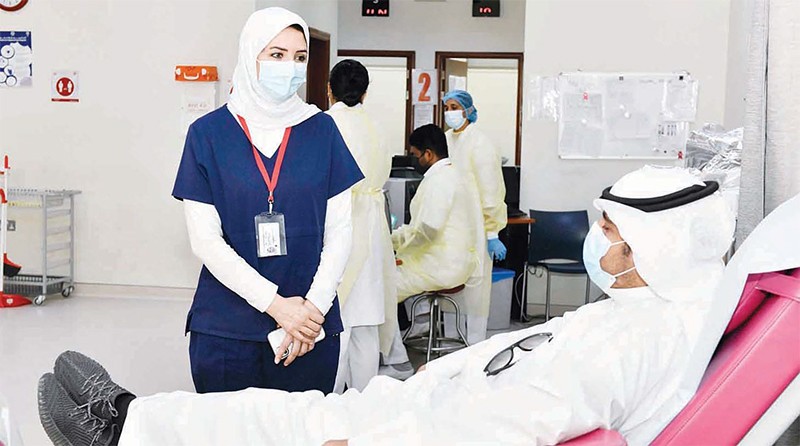26/04/2021
26/04/2021
KUWAIT CITY, April 26: “There is a recurring tragedy that has been generating problems and increasing pain and suffering … There is a humanitarian cry that reverberates in the corridors of hospitals.” These are some of the descriptions about the problem related to elderly patients being abandoned in hospital wards. This has been highlighted more than once, but it still exists. There are a number of elderly people who were brought in by their families for treatment and then abandoned without someone to take them back home, despite being discharged by the doctors, reports Al-Qabas daily.
At a time when the Ministry of Health is facing great pressure due to the repercussions of the COVID-19 pandemic and the increasing rates of bed occupancy in wards and intensive care rooms for COVID-19 patients, it is trying to find radical solutions to the phenomenon of “forgotten” patients, whose number has risen to 221 and is distributed in various hospitals in the country.
The daily revisited this painful phenomenon, and discovered that the pain of medical staff has increased and their burdens doubled. It was noticed that elderly Kuwaitis were brought to hospitals by their children and then left behind. Also, there are residents whose families and embassies refuse to receive them for various reasons. The Ministry of Health faces legal, social and humanitarian challenges in dealing with these patients.
However, the injustice of the relatives who caused the neglect of patients and left them in hospitals, is matched by double efforts by the medical and nursing staff to alleviate the pain of those forgotten, as they have been lying in hospital wards and rooms for long periods, often for years. This led some hospitals to recently transfer a number of patients, who are either infected with COVID-19 or other diseases, to the Kuwait Oil Company Hospital in Ahmadi area with the aim of providing new beds for them.
The phenomenon of discharged patients who remain back in hospitals for months and years requires more organizational measures to be taken so that beds can be provided to other patients, such as allocating alternative sites for them instead of occupying the beds.
According to health officials, there are other aspects to this phenomenon that periodically haunts the medical and nursing staff. There are difficult humanitarian scenes that they witness when supervising patients who have been discharged but do not find anyone to initiate clearance procedures for them. There are cases of disease that spread in the hospital wards for months, and there are some patients who spent years in hospitals without receiving even a single visit. They said, “There are people who resorted to changing their phone number to ensure that the hospital administration does not communicate with them continuously.
Some others visit their sick relatives for a very short period with the aim of not meeting with the doctors and nurses. Some relatives refuse to take their patient out due to lack of place at their homes to accommodate them or the inability of the family to assign a nurse to provide home care to the sick relative.”
Regarding the number of patients discharged from hospitals, the sources explained that the numbers vary due to the death of some in the hospital. Some exit the hospitals after an alternative location is found for them or after ensuring that their relatives provide a place for them. Sometimes, the concerned embassy intervenes to extract their citizens who stayed in hospitals for a long period.
The latest statistics indicate that there are about 221 cases authorized to be discharged from six hospitals. There are about 24 cases in Farwaniya Hospital, 84 in Mubarak Al-Kabeer Hospital, 26 in Sabah Hospital, 30 in Amiri Hospital, 23 in Adan Hospital, and 34 cases in Jahra Hospital. Among these patients include children who suffer from physical disabilities and young people whose parents refuse to accept them due to their limited capabilities and their inability to incur monthly sums of money for providing health care for their children. The sources revealed that some of such cases in Mubarak Al- Kabeer and Adan hospitals have been transferred to the Kuwait Oil Company Hospital in Ahmadi.
Blood Bank continues to receive donors
The Central Blood Bank continues its role in serving Kuwait and continues to work and receive donors during the partial ban period from 8 pm to 12:30 am and throughout the week without stopping to cover the needs of all Kuwait hospitals of blood and platelets. All segments of society, including those interested in setting up blood donation groups on social media, interact, especially when the bank announces on its offi- cial website the urgent need for donors, whether blood or platelets, as a result of the presence of patients who need to do so quickly. (KUNA)



